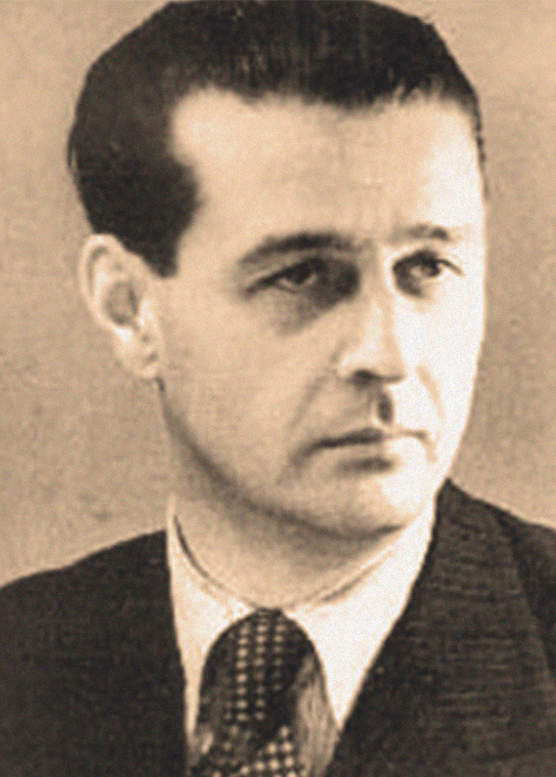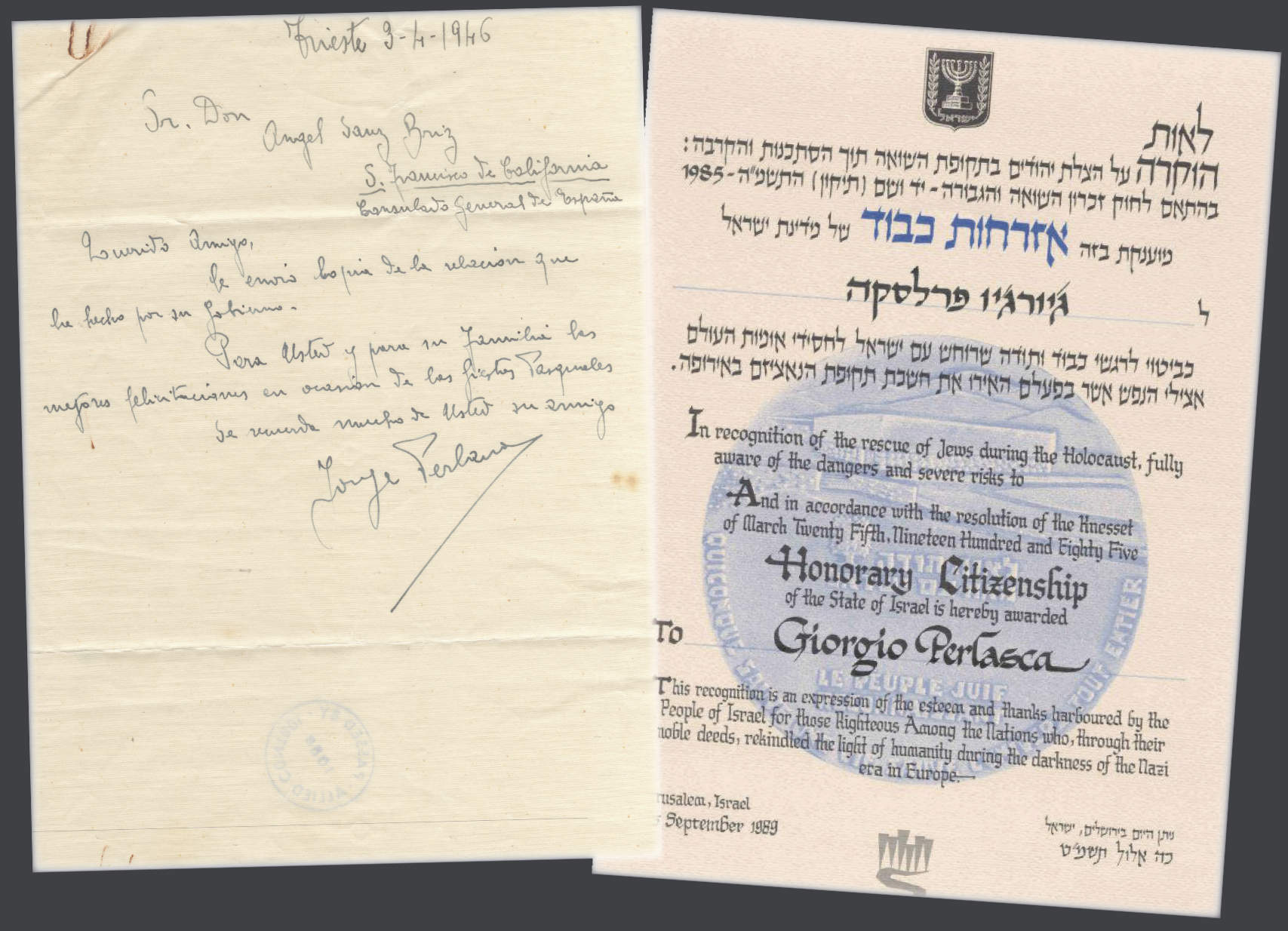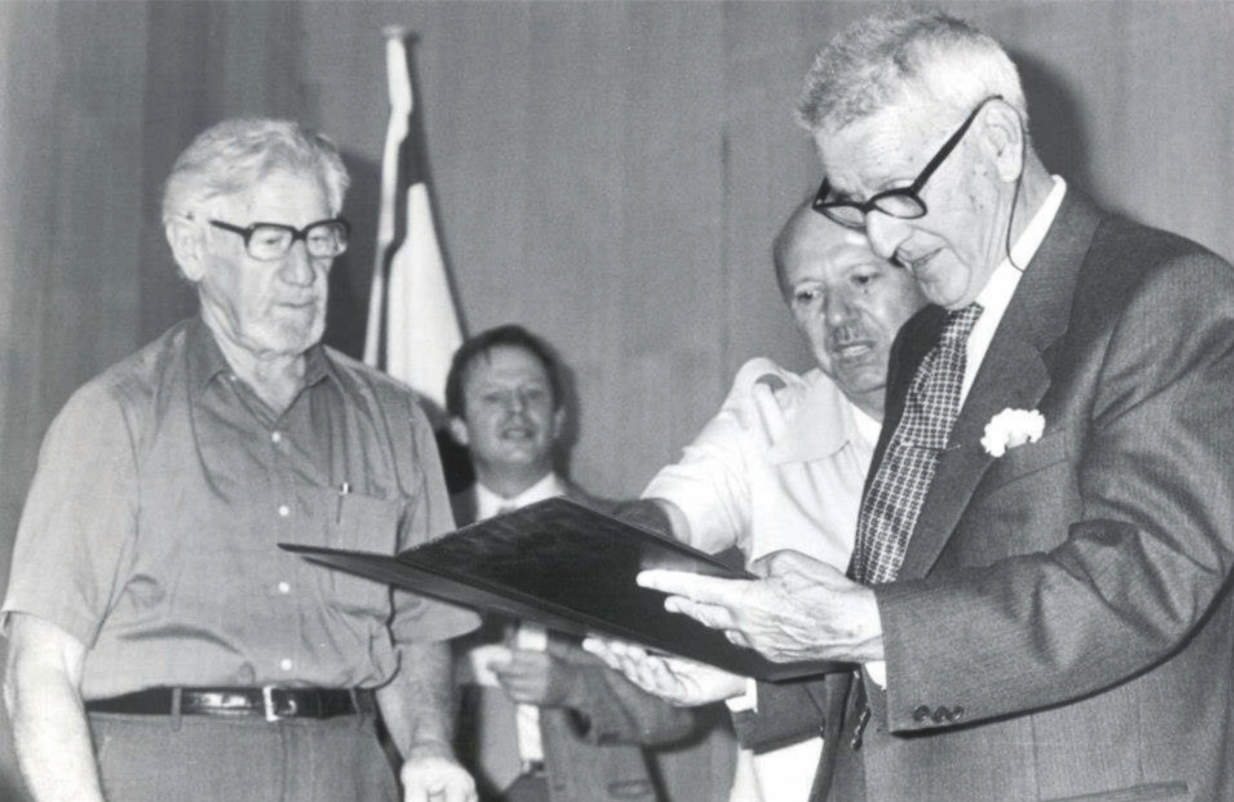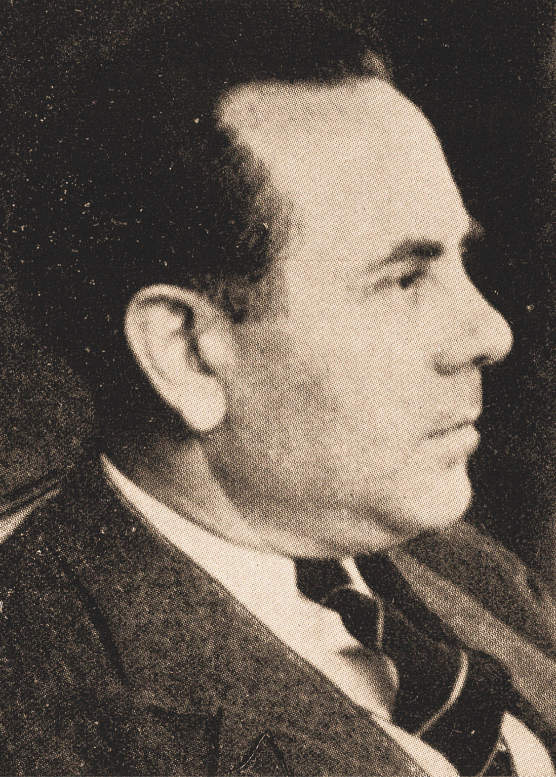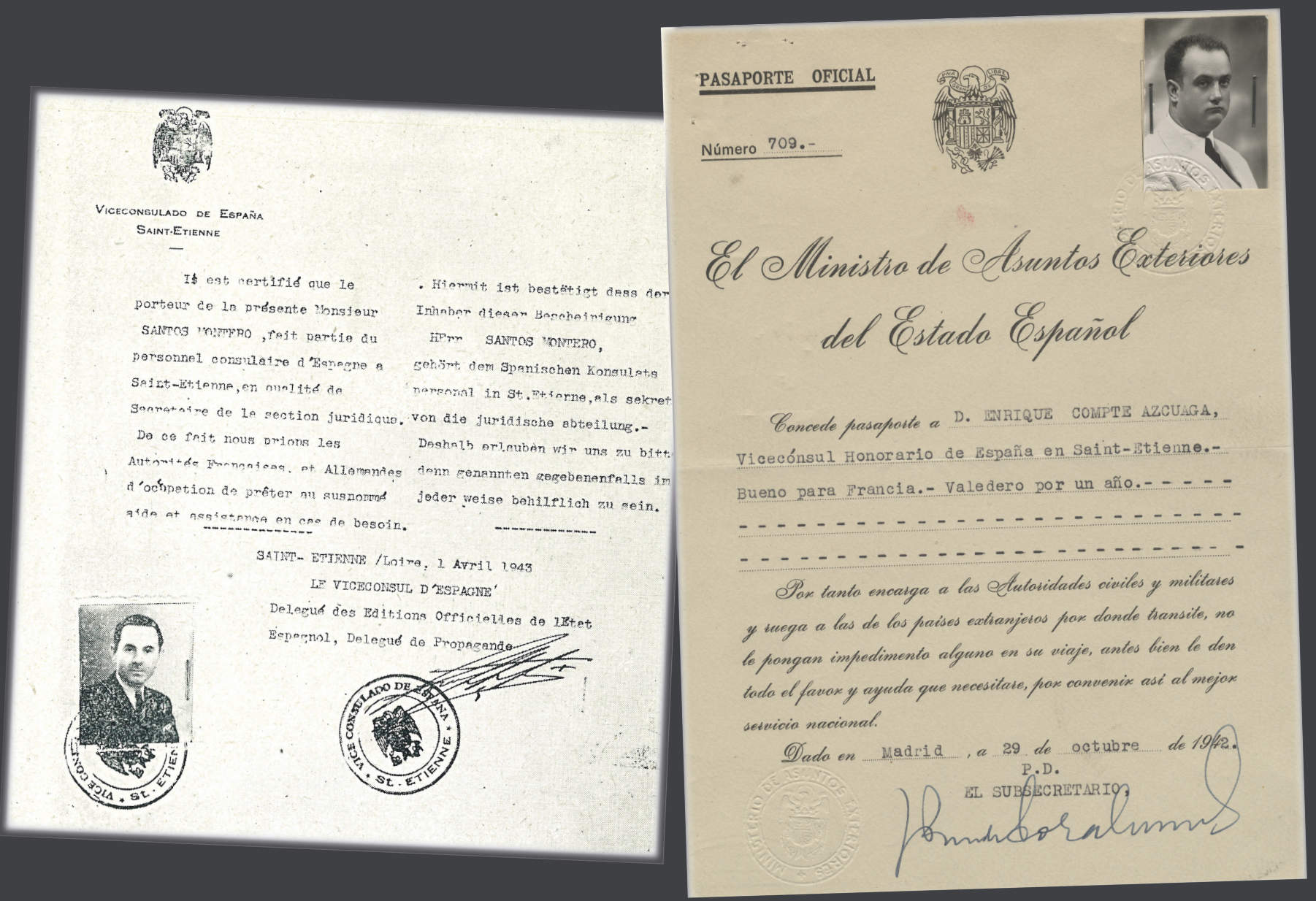FAKE CONSUL (BUDAPEST, 1944-1945)

(GIORGIO) JORGE PERLASCA
The great impostor
Giorgio Perlasca (1910-1992) provides us with a fascinating story of deception, as well as a paragon of courage, skill and loyalty to a homeland that was not his own: Spain. "Everything I did was out of my friendship with you, my sympathy for the Spanish people, and in a humanitarian spirit." That is how he described his actions to his former "boss", Ángel Sanz Briz, in August 1945.
As a former fighter, one of the Italian volunteers in the ranks of the National side during Spain's Civil War, on 1 November 1944 Perlasca was granted diplomatic protection and a passport by the Spanish Legation in Budapest, as he felt persecuted and in danger following the occupation of Hungary by Nazi troops.
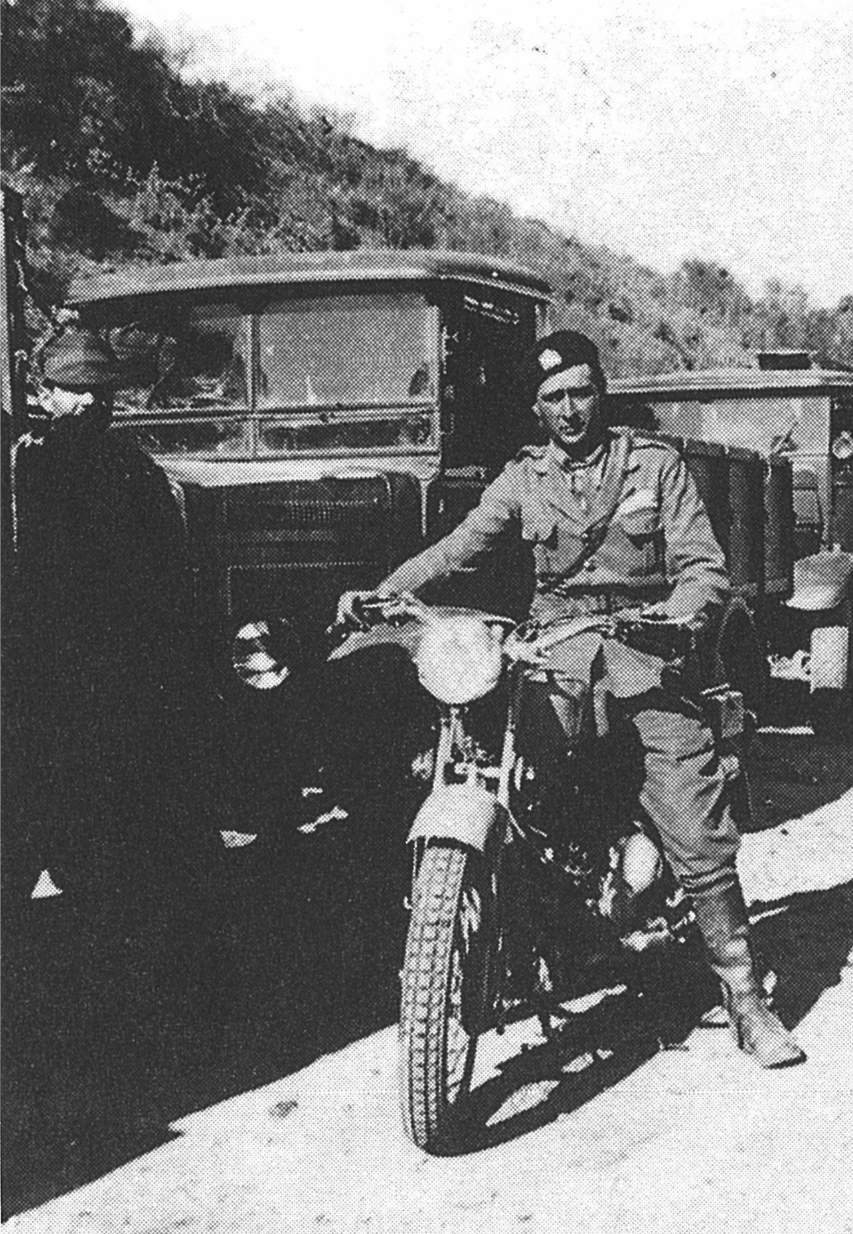
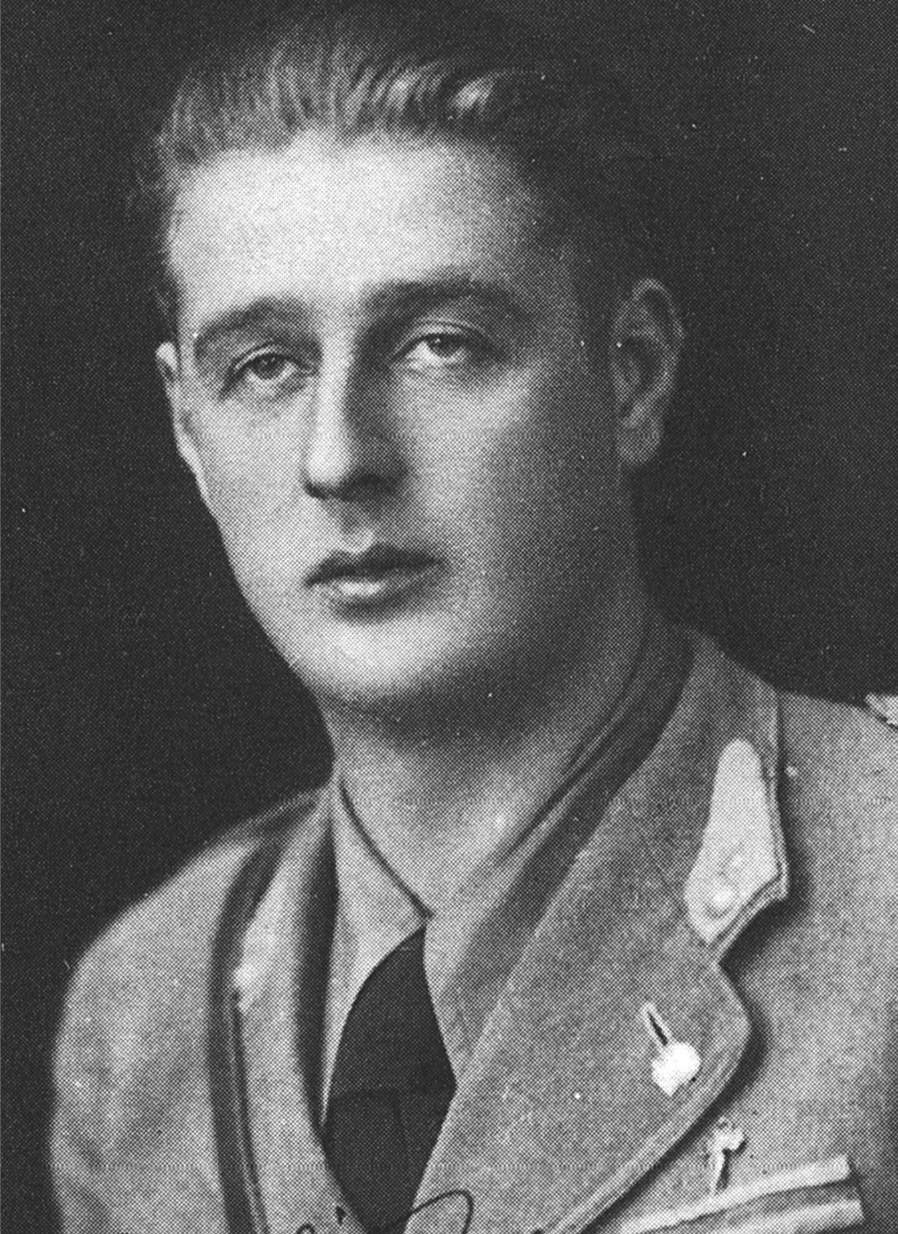
Two photographs of Perlasca as an Italian volunteer in the ranks of the National side during Spain's Civil War.
He then became known as Jorge, and at just 34 began helping Ángel Sanz Briz to protect Jews, especially those residing in protected houses.
When on 6 December 1944 Sanz Briz was forced to leave Budapest because of the advance of the Soviets — who were already practically at their doorstep — Perlasca took the initiative, with no authorization and unbeknownst to the Foreign Ministry authorities in Madrid, but with the support of Zoltan Farkas, the Legation's legal counsellor. Proving that he was a man of action, Perlasca quickly made everyone — including the Hungarian authorities — believe that Spain had appointed him Consul. This fake identity would give him the necessary coverage to continue the humanitarian work carried out by Sanz Briz and before that by Miguel Ángel de Muguiro.
Until the liberation of Budapest by Soviet troops on 16 January 1945, Jorge Perlasca was able to stop — on several occasions — the evacuation of Spain's protected houses by the Arrow Cross militia. It was unfortunately common for these Hungarian Nazis, also known as Nyilas, to assault these houses and take the Jews they found in them to the Danube to kill them and throw their bodies into the river. In the face of all of this, Perlasca acted with great courage, boldness and bravado: risking his own life, he wielded his credentials and diplomatic immunity in order to prevent Jews' eviction and to save them from a certain death. He was even able to obtain the liberation of another group of Spain's protectees when they were about to be loaded onto German SS lorries for deportation.
The fake consul designed a monitoring and surveillance system among the houses, providing him with prompt information on detentions and other severe and frequent tragic episodes caused by the SS and by the Hungarian Nazis. Moreover, in a deprived Budapest, where there food was scarce, he bought — with the help of the Red Cross — whatever food he could find. He even made a deal with a baker for bread to be delivered daily to the houses. Perlasca was especially concerned about finding orphanages for the children of deported or murdered parents.
Another of his daring actions consisted in continuing to issue new letters of protection. In order to give them greater credibility, he dated them before 4 December, when Sanz Briz was still residing in Budapest.
Finally, it is worth highlighting that, as a Spanish diplomat (albeit a fake one), Perlasca participated in several meetings of the neutral legations' cooperation committee. This was a joint effort by Sweden, Switzerland, the Holy See, Portugal and Spain to stop the deportation of Jews, request humane treatment for those already in concentration camps, denounce "cruel" measures against innocent people — particularly children — and demand that the Hungarian government respect the letters of protection issued by neutral powers.
Giorgio Perlasca died in Padova on 15 August 1992. A year earlier, in May 1991, the Spanish government had decorated him as Commander of the Order of Isabella the Catholic.
On 9 June 1988, Yad Vashem recognized him with the title of Righteous among the Nations.
FAKE VICE-CONSUL (SAINT-ÉTIENNE, 1942-1944)

SAMUEL SKORNICKI, ALIAS SANTOS MONTERO SÁNCHEZ
From Polish Jew to Spanish diplomat
The odyssey of Samuel Skornicki (1899-1957), who became Santos Montero Sánchez — a fake Spanish diplomat who was a real French patriot and Jewish activist — is a fascinating story.
A Pole whose father was a rabbi, as a young man he joined underground anti-Soviet groups. He went to France to study law, later becoming a naturalised citizen of that country.
In June of 1940, after the German occupation, Skornicki left Paris for the small town of Lavaur, outside Toulouse, with his wife and three daughters. He managed a textile company along with a Jewish friend, and worked with the Resistance to evacuate Allied aviators into Spain using fake identities.
Skornicki fled to Algeria in December 1941, when he was found out by the Sicherheitsdienst, the SS intelligence service. After a brief stay in Oran, he set himself up at the Hotel Victoria in Toulouse, which was managed by a Spanish refugee. Through the hotel manager, he met the Count of La Granja, the Spanish Red Cross director who was working to get French prisoners out of the Miranda de Ebro (Spain) prisoner of war camp, and who recommended Skornicki to Enrique Compte Azcuaga, the Spanish Vice-Consul in Saint-Étienne. From late 1942 onwards, Skornicki became the Vice-Consul's right-hand-man and legal attaché.
Saint-Étienne was a major industrial centre, the seventh-largest city in France, with a Spanish expatriate population numbering more than 7000.
Compte Azcuaga, aware that the surname of Skornicki made it difficult to pass as a Spaniard, asked him to come up with an alias. Since they were talking over a bottle of Montero liqueur, it was decided to change Samuel Skornicki to Santos Montero Sánchez.
At the end of 1942, after Germany's occupation of Vichy France, until early 1944, the activities of "Montero Sánchez", under the guise of his identity as a legal attaché, were focused intensely on working with the groupes francs (commandos) of the Resistance network in the Loire. Living under this false identity, he cooperated in hiding and providing travel assistance to fellow Jews, French Resistance members and Spanish Republican refugees, using the Consulate's official vehicle, and providing the proper German and French documents.
After Spain's Vice-Consul went back to Madrid for health reasons in early 1944, the metamorphosis into Montero Sánchez reached its apotheosis when he found a copy of the 1862 Consular Convention between Spain and France, which stated that in the absence of the titular Vice-Consul, another official could be appointed as acting Vice-Consul. Thus, as Montero Sánchez he decided to appoint himself the new Vice-Consul, with all of the diplomatic immunity and privileges that went along with the title.
Once, while on a train to Lyon in June 1944, he had the sangfroid to coolly present his false diplomatic credentials to the German police, convincing them to give him the custody of two young Jews whom he said were Sephardic Spanish nationals.
As Vice-Consul he also rented several properties as annexes to the Vice-Consulate, calling them archives, or commercial or press offices. Protected by their supposed Spanish diplomatic status, Santos Montero was really using these premises to store arms, underground pamphlets and other compromising documents, as well as to shelter fugitives or people threatened with deportation. These included Itkin Roubin, a 44-year-old Jew of Russian origin, and his family, as well as Léon Kleyman, a naturalized French Jew.
In one of these installations, Santos Montero kept a printing press for making fake identity certificates. He printed 6000 copies of a document providing protection for Spanish refugees in France, based on the reciprocity established in the 1862 Consular Convention. By so doing, he avoided their being drafted into the STO (Compulsory Work Service) and taken to Germany. He also did the same for some French Resistance members and a number of Jews.
These activities of "Vice-Consul Santos Montero'' would have been impossible without the help and complicity of two officials at the Vice-Consulate: Chancellor Feliciano Martín-Galán and his young assistant, Antonio Barrero. Santos Montero also counted on inside help from several French prefects, such as André Boutemy and Gérard Poggioli.
After the liberation of Saint-Étienne by Allied troops in September 1944, back to using his true identity as Samuel Skornicki, he continued his humanitarian work assisting Jewish survivors of the Holocaust. In August 1946 he was appointed Secretary-General of the Working Group for Assisting Jewish Immigrants, an organization that helped 15,000 Polish Jews who remained in France before emigrating to Israel.
In 1947 he himself emigrated to the United States, dying ten years later in Melbourne.

 Loading
Loading

